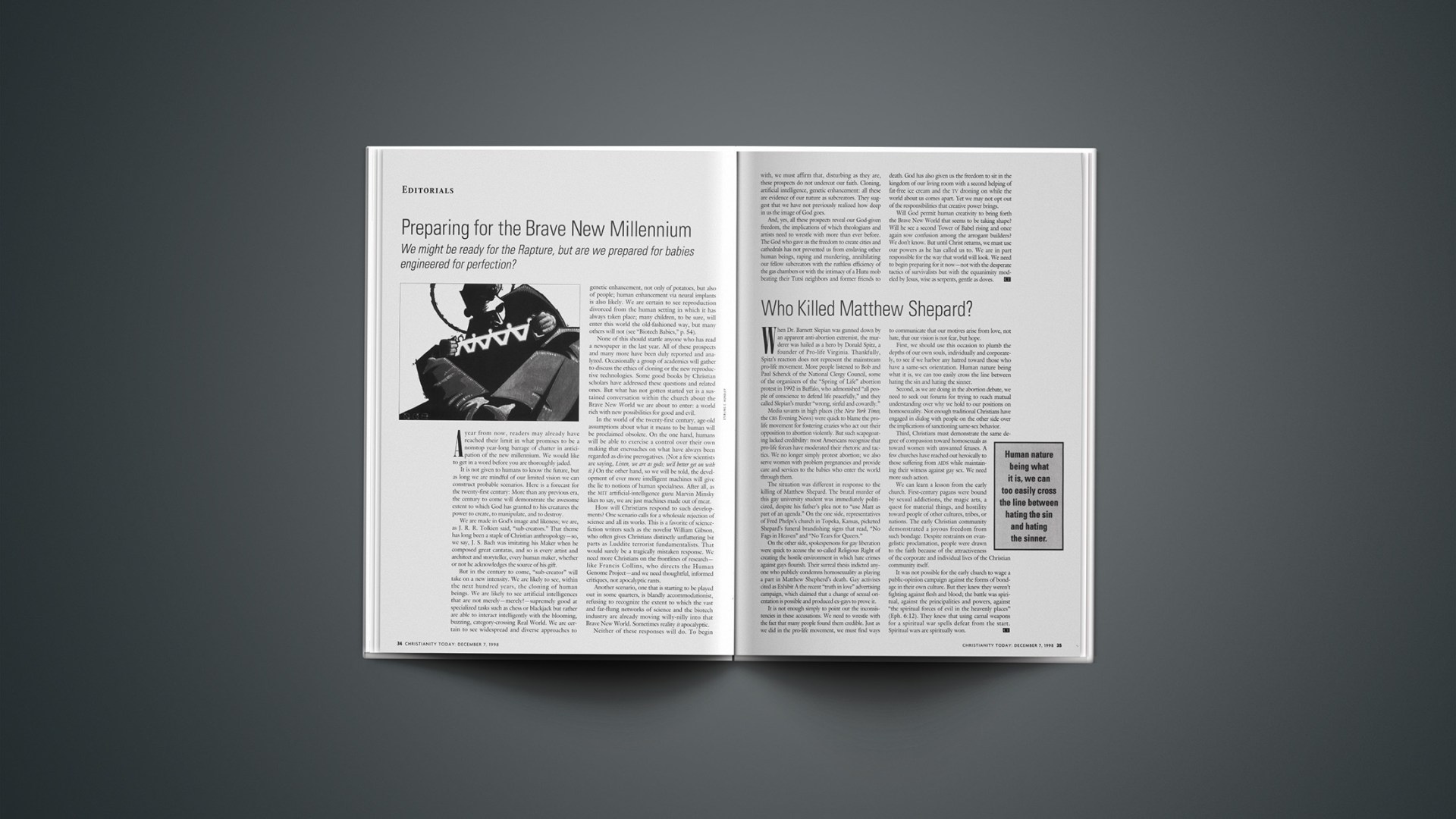When Dr. Barnett Slepian was gunned down by an apparent anti-abortion extremist, the murderer was hailed as a hero by Donald Spitz, a founder of Pro-life Virginia. Thankfully, Spitz’s reaction does not represent the mainstream pro-life movement. More people listened to Bob and Paul Schenck of the National Clergy Council, some of the organizers of the “Spring of Life” abortion protest in 1992 in Buffalo, who admonished “all people of conscience to defend life peacefully,” and they called Slepian’s murder “wrong, sinful and cowardly.”
Media savants in high places (the New York Times, the CBS Evening News) were quick to blame the pro-life movement for fostering crazies who act out their opposition to abortion violently. But such scapegoating lacked credibility: most Americans recognize that pro-life forces have moderated their rhetoric and tactics. We no longer simply protest abortion; we also serve women with problem pregnancies and provide care and services to the babies who enter the world through them.
The situation was different in response to the killing of Matthew Shepard. The brutal murder of this gay university student was immediately politicized, despite his father’s plea not to “use Matt as part of an agenda.” On the one side, representatives of Fred Phelps’s church in Topeka, Kansas, picketed Shepard’s funeral brandishing signs that read, “No Fags in Heaven” and “No Tears for Queers.”
On the other side, spokespersons for gay liberation were quick to accuse the so-called Religious Right of creating the hostile environment in which hate crimes against gays flourish. Their surreal thesis indicted anyone who publicly condemns homosexuality as playing a part in Matthew Shepherd’s death. Gay activists cited as Exhibit A the recent “truth in love” advertising campaign, which claimed that a change of sexual orientation is possible and produced ex-gays to prove it.
It is not enough simply to point out the inconsistencies in these accusations. We need to wrestle with the fact that many people found them credible. Just as we did in the pro-life movement, we must find ways to communicate that our motives arise from love, not hate, that our vision is not fear, but hope.
First, we should use this occasion to plumb the depths of our own souls, individually and corporately, to see if we harbor any hatred toward those who have a same-sex orientation. Human nature being what it is, we can too easily cross the line between hating the sin and hating the sinner.
Second, as we are doing in the abortion debate, we need to seek out forums for trying to reach mutual understanding over why we hold to our positions on homosexuality. Not enough traditional Christians have engaged in dialog with people on the other side over the implications of sanctioning same-sex behavior.
Third, Christians must demonstrate the same degree of compassion toward homosexuals as toward women with unwanted fetuses. A few churches have reached out heroically to those suffering from AIDS while maintaining their witness against gay sex. We need more such action.
We can learn a lesson from the early church. First-century pagans were bound by sexual addictions, the magic arts, a quest for material things, and hostility toward people of other cultures, tribes, or nations. The early Christian community demonstrated a joyous freedom from such bondage. Despite restraints on evangelistic proclamation, people were drawn to the faith because of the attractiveness of the corporate and individual lives of the Christian community itself.
It was not possible for the early church to wage a public-opinion campaign against the forms of bondage in their own culture. But they knew they weren’t fighting against flesh and blood; the battle was spiritual, against the principalities and powers, against “the spiritual forces of evil in the heavenly places” (Eph. 6:12). They knew that using carnal weapons for a spiritual war spells defeat from the start. Spiritual wars are spiritually won.
Copyright © 1998 Christianity Today. Click for reprint information.










